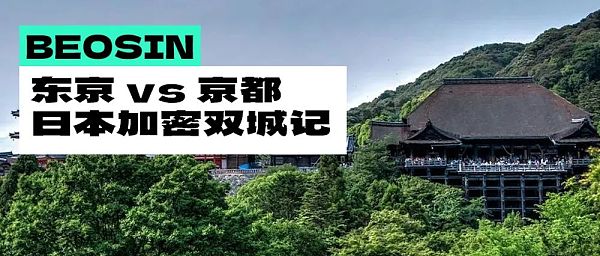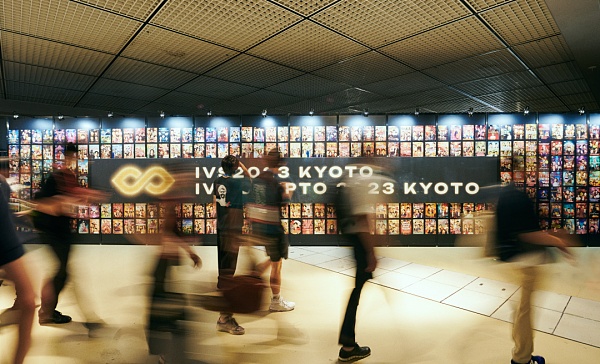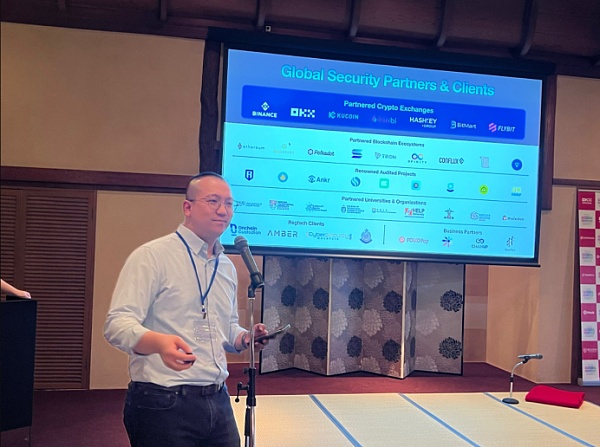Tokyo vs Kyoto Japan’s Cryptocurrency Twin Cities
Tokyo vs Kyoto Japan's Crypto Twin CitiesAuthors: Beosin Donny, Eaton, Dorit
Tokyo and Kyoto are the two most representative cities in Japan.
Tokyo is the capital of Japan. It is the center of politics, economy, education, and culture in Japan, and also an important hub for international exchange and innovation. Most of Japan’s Web3 encryption organizations and active VCs are located in this bustling city.
Kyoto has a long history and rich cultural heritage. With its ancient charm, delicacy, and tranquility, Kyoto, despite its reserved and restrained aesthetics, has become lively again due to encryption.
- Reading the Bitcoin ETF 5 futures ETFs with total assets of nearly $1.3 billion. How much does the news of the Bitcoin application affect?
- Analysis of Bitcoin ETFs The total assets of 5 futures ETFs are nearly 1.3 billion US dollars, how much impact does the application news have on Bitcoin?
- Some ‘dirt’ on the SEC Chair
In an era where technological progress is shaping the future economy of countries around the world, Japan is taking a strategic leap towards the Web3 revolution.
Realizing the transformative potential of blockchain technology, cryptocurrencies, and decentralized internet, Japan is working together to place cities like Tokyo and Kyoto at the forefront of this digital revolution.

Tokyo vs Kyoto, a tale of two Japanese blockchain cities
In late June of this year, the largest international cryptocurrency summit in Japan, IVS Crypto 2023, was held in Kyoto. Many well-known investment institutions set up booths at the venue to connect with global Web3 startups. This has made Kyoto, the ancient capital, active again due to encryption.

 IVS Crypto 2023 Conference
IVS Crypto 2023 Conference
During the three-day conference, there were also many Japanese-style peripheral activities. Among them, the Beosin-sponsored Web3 Shining Golden LianGuaivilion was held on June 28th at the Golden Pavilion, successfully attracting many local Japanese teams to participate.
In the evening, Beosin also held the “Web3 GEISHA ROOFTOP LianGuaiRTY” high-end cocktail party in Kyoto, providing an important communication platform for international blockchain project teams and investors. We also saw the perfect fusion of tradition and innovation in Kyoto on this night.
 Beosin BD representative at the Kyoto event
Beosin BD representative at the Kyoto event
After the successful IVS Crypto event in Kyoto, Tokyo will also welcome the first large-scale international blockchain conference of the second half of this year, WebX, on July 25-26.
This is a conference dedicated to bridging the gap between Web2 and Web3, Japanese and English, and Japan and other regions of the world. At that time, top Web3 entrepreneurs, investors, and developers from around the world will gather to discuss how to introduce decentralized technologies such as blockchain into society.

It is worth mentioning that Beosin has reached a strategic cooperation with Cryptogram Venture (CGV), the organizer of the second Tokyo Web3 Summer Hackathon.
Beosin will provide free Beosin VaaS smart contract formal verification platform usage authorization and 30 minutes of on-site and remote guidance for all projects participating in the Tokyo Web3 Summer Hackathon. This collaboration aims to provide security support to blockchain projects and developers worldwide, to promote the development and application of blockchain technology.
Web3 cryptosystems “landed” in Tokyo and Kyoto
It can be seen that cities in Japan such as Tokyo and Kyoto are increasingly welcoming to Web3.
For example, Sony Network Communications, a subsidiary of Sony Group, recently partnered with Astar Network to launch a Web3 incubation program. This program is used to incubate projects that focus on the practicality of NFTs and decentralized autonomous organizations (DAOs) and aims to explore how blockchain technology can solve various problems in the industry.
Similarly, automotive giant Toyota is also studying the use cases of blockchain technology. In early April, the company held a comprehensive Web3 hackathon on Astar Network to help Toyota develop more efficient team management strategies and optimize its business decision-making processes. Regarding these developments, Sota Watanabe, the founder of Astar Network, said:
“Many Japanese companies, especially large companies like Toyota and Sony, want to work on Web3. I think the reason is simple: we completely missed the Web2 revolution, so Web3 is the next major opportunity for the Japanese economy.”
In the Tokyo and Kyoto regions, we also see some growing Web3 crypto institutions. Here are some representative institutions:
Web3 Enterprises/Institutions in Tokyo
1. HashPort
HashPort Group was founded in 2018 with the vision of digitalizing assets and has accumulated a wealth of achievements in blockchain technology. HashPort currently has three major businesses: HashPort, which provides blockchain technology consulting and solutions; HashLianGuailette, which provides NFT-related technical support; and HashBank, which provides financial infrastructure services. In April 2023, HashPort completed a Series C financing of over 8.9 million US dollars.
2. KEKKAI
KEKKAI is a startup that focuses on enhancing the security of cryptocurrency trading. Although KEKKAI was formally established in early 2023, its wallet security plugin was officially launched in December 2022. In February 2023, KEKKAI completed a pre-seed round of financing of 50 million yen, with Skyland Ventures as the investor. This funding will be used for product feature improvement and expansion of security business.
3. Skyland Ventures
Skyland Ventures is a relatively active domestic crypto fund in Japan. It has invested in KEKKAI and GoPlus in the blockchain security track, Orbiter Finance in the cross-chain track, Ethereum Layer2 Taiko in the infrastructure track, NFT data analysis platform NFTGO, and MEV resistance solution provider Wallchain. In April 2023, Skyland announced that its fourth fund has raised 5 billion yen and established a seed fund dedicated to Web3 investments.
4. MZ Web3 Fund
MZ Web3 Fund was founded by Yusaku Maezawa, known as the “Elon Musk of Japan”, and focuses on investing in Web3 projects. It is the most active crypto fund in Japan. MZ Web3 Fund has invested in 24 startups in the Web3 field, including decentralized storage project SINSO, payment tools Slash and Transak, development community WEB3DEV, gaming blockchain Oasys, and Web3 user growth platform Aki Network. MZ Web3 Fund will provide community resources from MZ Club and MZ DAO to the invested projects, helping them expand quickly in the Japanese market.
Web3 Companies/Organizations in Kyoto
1. QURAS
QURAS, founded in 2017, has a branch in Kyoto, Japan, and is committed to providing privacy-focused blockchain solutions for enterprise clients. Its application scenarios include digital asset trading, supply chain management, healthcare, and financial services. In 2018, QURAS also launched the mobile wallet Quras Wallet and partnered with several exchanges such as Uniswap, bithumb, and Mooniswap. In 2019, QURAS completed a Series A funding round of $16 million with participation from Roark Fund, SEB Venture Capital, and other institutions.
2. SORAMITSU
SORAMITSU, founded in 2016, specializes in research and development of blockchain technology, aiming to provide high-quality blockchain solutions for enterprises, governments, universities, and communities. SORAMITSU has many well-recognized projects in the cryptocurrency field, including Bakong and Hyperledger Iroha. In 2016, SORAMITSU developed the project Hyperledger Iroha and contributed it to the Linux Foundation’s Hyperledger project, providing assistance for enterprises and financial institutions to manage digital assets.
3. NEO KYOTO NFT ARTs
NEO KYOTO NFT ARTs is a Web3 education project jointly planned by Huager Holdings Co., Ltd. and SMBC Nikko Securities Inc. The project involves NFT art created by students in Kyoto City, depicting the future space and content of Kyoto, and plans to showcase and sell NFTs globally. A portion of the sales revenue will be donated to Kyoto City for educational purposes. The project aims to establish a creative ecosystem that integrates NFT art with urban development.
4. Bar Krypto
Bar Krypto is a cryptocurrency bar in Kyoto, providing a place for digital nomads to passionately discuss Web3. Currently, Bar Krypto operates on a membership system, and customers can purchase their membership NFT on OpenSea to become a member. Members can name cocktails and participate in DIY renovations and event planning in the basement.
The Unavoidable Phantom of the Japanese Crypto Field
Japan was once a pioneer in the cryptocurrency field but soon fell victim to hackers.
In 2014, the Japanese exchange Mt. Gox was attacked by hackers. Then, in early 2018, hackers launched another attack and stole over $500 million from the Japanese exchange Coincheck, severely hampering Japan’s crypto development.
These two hacking incidents have greatly reminded regulatory agencies. After these hacking incidents, Japan has requested the separation of customer assets and exchange assets, and most of the exchange assets are stored in cold wallets.
Therefore, when FTX collapsed this year, Japan’s regulatory approach showed its advantages.
Ryosuke Ushida, the Chief Financial Technology Officer of the Financial Services Agency, which regulates cryptocurrencies, said, “FTX JaLianGuain’s Japanese customer assets are likely to be returned without being significantly affected by the global bankruptcy application under Chapter 11 of the US Bankruptcy Law.” It can be seen that Japan’s cryptocurrency asset regulatory policy has played a significant role in protecting the assets of local Web3 users.

Japan at the forefront of cryptocurrency asset regulation
In 2016, Japan revised the Payment Services Act and the Funds Settlement Act, and officially established them in 2017, clarifying the legal status of cryptocurrencies. On the one hand, cryptocurrencies are considered “cryptographic assets” in the Payment Services Act. Operators engaged in the purchase, sale, or management of cryptographic assets for the benefit of others (and intermediaries in such activities) must register as cryptocurrency asset trading services.
On the other hand, the Financial Services Agency, a financial regulatory authority in Japan, regulates cryptocurrency exchanges and blockchain transferable partnership interests through the Financial Instruments and Exchange Act (FIEA), which are considered securities (ordinary partnership securities that are transferred in a non-electronic manner). Under the FIEA regulations, businesses that provide or act as intermediaries in providing derivative instruments related to cryptographic assets are classified as Category 1 financial instrument businesses. These businesses constitute investment advisory or investment management businesses and require corresponding registration under the FIEA.
As for stablecoins, the Japanese government believes that depending on whether these stablecoins can be exchanged for fiat currencies, stablecoins may be classified as cryptographic assets or payment methods in remittances. In addition, because NFTs are currently not considered to have the function of means of payment, no agreement has been made under the current regulatory framework. However, the Financial Services Agency has included the establishment of a regulatory framework for NFTs in its agenda.
Nevertheless, Japan is still in the process of trial and error and adjustment in the regulation of cryptographic assets. With the development of the cryptocurrency field, related policies will also gradually evolve.

In April 2023, the Web 3.0 project team of Japan’s ruling party released a white paper proposing recommendations to promote the development of Japan’s cryptocurrency industry. In June 2023, Japan’s “Funds Settlement Bill Revision Bill” was voted through in the Upper House, becoming the world’s first country to enact a stablecoin law.
Akihisa Shiozaki, Secretary-General of the project team, pointed out in a recent interview: “The cryptocurrency industry has always been driven by early adopters, but it will now shift to mass adoption.”
He pointed out that large Japanese companies have already entered this market, and the mobile operator NTT Docomo recently promised to invest up to 600 billion yen ($4 billion) in Web3 infrastructure. Not only that, major financial institutions are also seeking to issue stablecoins to digitize the national economy.
In conclusion,
It can be seen that Japan’s embrace of cryptocurrencies and Web3 initiatives is clearly a strategic move aimed at injecting new vitality into the economy. If Japan wants to leverage the emergence of Web3 to drive new economic growth, it must overcome many obstacles. Whether in crypto-friendly cities like Tokyo or Kyoto, there needs to be the birth of truly innovative Web3 companies that can demonstrate the potential of blockchain technology and serve as inspiration for other Japanese entrepreneurs. On the other hand, we can also see that the country’s Web3 policies, corporate partnerships, and regulatory progress are slowly paving the way for local Web3 development.
We will continue to update Blocking; if you have any questions or suggestions, please contact us!
Was this article helpful?
93 out of 132 found this helpful
Related articles
- Bitcoin Lightning Network + Nostr Decentralized Social Payment New Paradigm
- Is CoinDesk selling at a loss with a valuation of $125 million after being in business for ten years?
- The fourth halving of Bitcoin is imminent, will the cryptocurrency market repeat yesterday’s story?
- Why has the significant discount on GBTC gradually narrowed recently?
- Exploring the Vietnamese crypto market VC interest is growing, NFT community is rising
- Exploring the Reasons behind the Low Adoption Rate of DeFi in the South Korean Cryptocurrency Market
- NYDIG What impact will the forecasted market size of Bitcoin spot ETF have?




